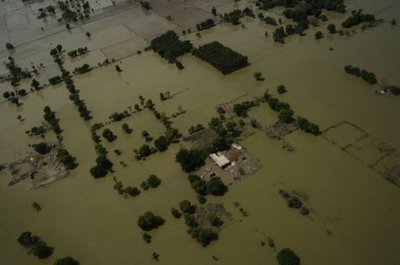STOCKHOLM (AFP) – The drought in Russia and floods in Pakistan are part of a global trend of unpredictable weather patterns and rainfall that threaten food security, experts gathered in Stockholm said.
“We are getting to a point where we are getting more water, more rainy days, but it’s more variable, so it leads to droughts and it leads to floods,” Sunita Narain, the head of the Centre for Science and Environment in India, told AFP on the sidelines of the World Water Week conference.
“That is leading to huge amounts of stress on agriculture and livelihoods,” she said, adding that “climate change is making rainfall even more variable.”
Narain was one of around 2,500 experts from 130 countries gathered in Stockholm for the 20th edition of the World Water Week, which opened Sunday and is set to run until Saturday.
Her comments came as eight million people in Pakistan remain dependent on handouts for their survival after monsoons caused devastating floods throughout the country.
Russia is also still struggling with the aftermath of its hottest summer on record, during which drought and fires destroyed a quarter of the country’s crops and prompted the government to slap a highly controversial ban on grain exports to protect domestic supplies.
This contributed to soaring global wheat and overall food prices and sparked worries of a crisis in global food supplies.
But it is not only in such extreme cases that changing weather patterns and unpredictable rainfall is causing problems.
“Millions of farmers in communities dependent on rain-fed agriculture are at risk from decreasing and erratic availability of water,” head of the Sri Lanka-based International Water Management Institute (IWMI) Colin Chartres said in a statement.
IWMI published a report Monday stressing that the unpredictable weather required large investments in a diverse array of water storage options to counter the uncertainty.
Some 66 percent of total crops in Asia are not irrigated, while in Africa a full 94 percent is rain-fed, according to the institute, which estimates that around 500 million people in Africa and India would benefit from improved agricultural water management.
World Water Week director Jens Berggren agreed that unpredictable rainfall was wreaking havoc.
“Climate change will lead to different weather patterns, and that is what we are already seeing in many places like Pakistan and Russia. It doesn’t rain the way it used to,” he told AFP.
Farmers in Uganda for instance used to know when to sow to get the best crop, but now they can no longer predict when the rain will come, Berggren pointed out.
“So they sow a little bit all the time to be on the safe side. They know their harvest could at any moment be washed away or dry up, so they try to spread the risk as much as possible,” he said.
“But this means that they get much smaller harvests than before,” he added.
While accepting that the world has recently experienced extreme weather shifts, Jan Lundqvist, who chairs the Stockholm International Water Institute’s Scientific Programme Committee, is wary on blaming global warming.
Pointing out that there have been periods of extreme weather patterns before, he said: “These kinds of fluctuations are part of human history, but climate change is probably making them more extreme.”


